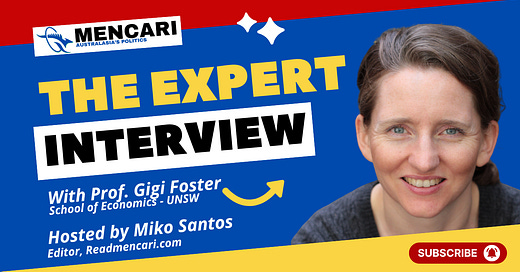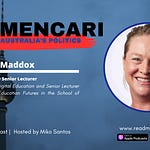Today’s episode is brought to you by Empower. You can empower your podcasting vision with a suite of creative solutions at your fingertips.
In this hard-hitting analysis of Australia's 2025-2026 federal budget, host Miko Santos interviews distinguished economist Professor Gigi Foster from the University of New South Wales who delivers a brutally honest assessment that cuts through political rhetoric.
Professor Foster characterizes the budget as election-year political theater rather than meaningful economic reform, dissecting everything from tax cuts to energy policy, housing affordability, and healthcare funding with precise economic reasoning that challenges both government and opposition narratives.
If you want to chat more about this topic, I would love to continue this conversation with you, over Twitter @realmikosantos!
This is not a sponsored video/audio. A small commission will be paid to us if you purchase anything through some of the affiliate links in our product listings.
In this episode, we cover:
Professor Foster characterizes the budget as politically motivated rather than addressing structural economic problems, describing the tax cuts as minimal—"a cup of coffee a week"—while failing to target corporate tax evasion and wealth inequality.
On energy policy, Foster strongly supports the opposition's gas reservation plan and fuel excise cut, arguing that Australia's abundant natural resources should be leveraged to reduce costs throughout the economy rather than focusing on premature green energy transitions.
Foster challenges the notion that environmental protection conflicts with economic development, stating that wealthier countries historically take better care of their environments, suggesting economic growth and environmental stewardship can be complementary.
The housing crisis requires multiple simultaneous solutions according to Foster, including reduced immigration in certain categories, increased housing construction, inheritance taxes on large estates, and reforms to the superannuation system to help younger Australians access housing earlier.
Despite government claims about inflation improvement, Foster warns about mounting national debt and its implications, explaining that debt accumulated without productivity-enhancing investments will crowd out essential future spending.
🎙️ ABOUT OUR EXPERT
Professor Gigi Foster is a distinguished economist from the University of New South Wales specializing in economic policy, labor markets, and public finance. She has published extensively on Australian economic issues and is a regular commentator on budget matters and fiscal policy. Her analysis brings academic rigor and practical insight to complex economic debates.
Resources and links mentioned in this episode:
Connect with Prof. Gigi Foster through Linkedin or UNSW website
Detailed Synopsis
The episode begins with Miko Santos introducing Professor Gigi Foster, a distinguished economist from the University of New South Wales known for her insightful analysis of economic policy. The conversation immediately addresses Treasurer Chalmers' claim that Australia is "turning the corner together" with this budget, which Professor Foster firmly rejects.
Foster characterizes the 2025-2026 federal budget as typical pre-election political maneuvering rather than substantive economic reform. She criticizes the budget for offering minor handouts—energy rebates and modest tax adjustments—without addressing fundamental structural issues in Australia's economy, society, health, or education systems. Foster suggests that many Australians lack the economic literacy to recognize these shortcomings, making such politically-motivated budgets effective despite their limitations.
When discussing the government's inflation forecasts, Foster expresses skepticism, noting that while inflation may be trending downward, the budget presentation was overoptimistic and failed to address more significant issues such as productivity decline, corporate tax evasion, and rising wealth inequality. She characterizes the income tax cuts as minimal—"a cup of coffee a week"—and explains that bracket creep during inflation will offset many of these benefits. Foster argues that addressing the receding tax base requires tackling corporate tax avoidance rather than adjusting income tax rates.
The conversation shifts to comparing alternative approaches to cost-of-living relief. Foster strongly supports the opposition's proposal to cut fuel excise for 12 months, explaining that such a measure would reduce costs throughout the economy by lowering transportation expenses for all goods, not just fuel purchases for consumers. She characterizes this as a non-inflationary approach to easing cost-of-living pressures.
On international economic challenges, Foster acknowledges Australia's vulnerability to global headwinds but emphasizes the country's fortunate position as a resource-rich nation. She identifies iron ore prices and China's economic health as crucial factors for Australia's economic wellbeing, suggesting that diversification beyond primary industries would strengthen Australia's resilience.
The discussion on energy policy reveals Foster's strong support for the opposition's national gas plan with East Coast Gas Reservation. She argues that Australia's abundant natural gas resources should be utilized more effectively to reduce energy costs rather than pursuing what she characterizes as premature transitions to renewable energy. Foster challenges the narrative that environmental protection conflicts with economic development, stating that wealthier countries historically take better care of their environments.
Regarding healthcare investment, Foster acknowledges the importance of the government's focus on general practitioners but argues that broader healthcare system reform is necessary. She emphasizes that despite increasing healthcare expenditure, Australians are experiencing declining health outcomes, suggesting fundamental failures in the health policy domain.
On the housing crisis, Foster advocates for a multipronged approach: reducing certain categories of immigration, building more public housing, reforming the superannuation system to give young people earlier access to their money, implementing inheritance taxes on large estates, and creating incentives for better utilization of existing housing stock.
The interview concludes with Foster expressing concern about the growing national debt, explaining that debt accumulated without productivity-enhancing investments will ultimately crowd out essential future spending. She suggests that neither major party is adequately addressing Australia's fundamental economic challenges and encourages voters to consider independent candidates with more comprehensive policy platforms.
What Readers Will Learn
An economist's critical assessment of the 2025-2026 federal budget beyond political rhetoric
The economic implications of proposed tax cuts and their actual impact on average households
How energy policy choices affect both cost of living and environmental outcomes
The complex interplay between immigration, housing policy, and affordability
Why traditional budget metrics like GDP and inflation forecasts may not reflect economic realities
The long-term consequences of government debt accumulation without productivity growth
Alternative policy approaches to address Australia's structural economic challenges
How to evaluate competing economic narratives from government and opposition
The economic trade-offs between short-term relief measures and long-term structural reform
Why economic growth and environmental protection can be complementary rather than conflicting goals
🚀 TOOLS AND SERVICES I RECOMMEND:
🎥 My favorite's tagging, channel growth, and management tool for YouTubers
► Download TubeBuddy Free Today! ➜ https://bit.ly/Tubebuddy-realmikosantos ► Download VidIQ ➜ https://bit.ly/vidIQ-realmikosantos
🎵 WHERE DO WE FIND OUR MUSIC:
► Epidemic Sound ➜ https://bit.ly/epidemicsound-AU
🎙️ OUR REMOTE RECORDING SOFTWARE
Zencastr - https://bit.ly/Zencastr-realmikosantos
📼 OUR PODCAST APPS ARE USING
Transistor FM –
https://transistor.fm/?via=realmikosantos
Captivate FM - https://www.captivate.fm/signup?ref=realmikosantos
Fiverr - https://bit.ly/Fiverr-realmikosantos
Headliner - https://bit.ly/Headliner-realmikosantos
📹 OUR VIDEO GEARS WE ARE USING
📼 MIKO'S KIT
This podcast is powered by Kangaroofern, Australia's Independent Podcast Management Company.
Thanks so much for listening to our podcast!
If you enjoyed this episode, be sure to subscribe so you'll be notified when a new episode is posted in the Apple podcast, Google podcast, Spotify, Stitcher or via RSS.
If you think others could benefit from listening, please share it on your socials.
You can also subscribe to the podcast app on your mobile device.
If you found value in this episode, leave us an Apple Podcast review. Ratings and reviews from our listeners are extremely valuable to us and greatly appreciated. They help our podcast rank higher on Apple Podcasts and expose our show to more awesome listeners like you.
This is a premium episode. If you would like to discuss this with other subscribers or get access to the episodes, visit The Freeman Chronicle
Got a News Tip?
Contact our editor via Proton Mail encrypted, X Direct Message, LinkedIn, or email. You can securely message him on Signal by using his username, Miko Santos.
More on Mencari
5 - Minute recap - for nightly bite-sized news around Australia and the world.
Podwires Daily - for providing news about audio trends and podcasts.
There’s a Glitch - updated tech news and scam and fraud trends
The Expert Interview - features expert interviews on current political and social issues in Australia and worldwide.
Viewpoint 360 - An analysis view based on evidence, produced in collaboration with 360Info
Mencari Banking - Get the latest banking news and financials across Australia and New Zealand
Friendly reminder: Right now, every subscriber has access to all of our content, whether it is paid or free. However, this will only be available during a brief promotional time. Above all, money is necessary for the establishment and maintenance of an independent media company such as this one. In case you value our work and would like to participate in it, kindly think about endorsing us with a paid subscription.















Share this post